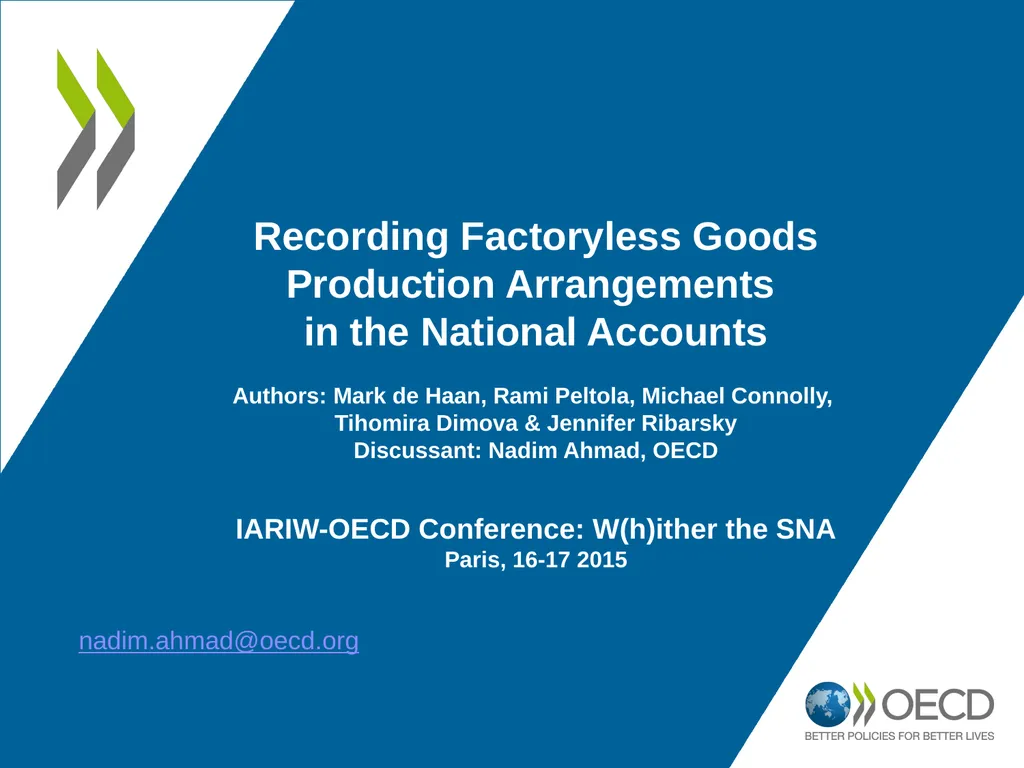Recording Factoryless Goods Production
Author : celsa-spraggs | Published Date : 2025-05-23
Description: Recording Factoryless Goods Production Arrangements in the National Accounts Authors Mark de Haan Rami Peltola Michael Connolly Tihomira Dimova Jennifer Ribarsky Discussant Nadim Ahmad OECD IARIWOECD Conference Whither the SNA
Presentation Embed Code
Download Presentation
Download
Presentation The PPT/PDF document
"Recording Factoryless Goods Production" is the property of its rightful owner.
Permission is granted to download and print the materials on this website for personal, non-commercial use only,
and to display it on your personal computer provided you do not modify the materials and that you retain all
copyright notices contained in the materials. By downloading content from our website, you accept the terms of
this agreement.
Transcript:Recording Factoryless Goods Production:
Recording Factoryless Goods Production Arrangements in the National Accounts Authors: Mark de Haan, Rami Peltola, Michael Connolly, Tihomira Dimova & Jennifer Ribarsky Discussant: Nadim Ahmad, OECD IARIW-OECD Conference: W(h)ither the SNA Paris, 16-17 2015 nadim.ahmad@oecd.org 2008 SNA and BPM6 Began to tackle the difficulties raised by new forms of global production With new accounting rules for goods sent abroad for processing and merchanting, reflecting a strict interpretation of the change of ownership principle with further implementation guidelines developed by Globalisation in the National Accounts and more recently the TFGP. 2 But It appears that further guidelines are needed 3 TFGP Explicitly considered factory-less producers (narrowly) defined as units (principals) that control the outcome of production of a good by undertaking the entrepreneurial steps and supplying inputs of intellectual property products (IPPs), concentrating on innovation and marketing decisions. FGPs usually control access and delivery of the final output to consumers and do not purchase nor supply any material inputs into the production process. 4 The issue - Classification ISIC guidelines provide detailed recommendations for units that outsource the entire production process: A principal who completely outsources the transformation process should be classified into manufacturing if and only if it owns (some of) the input materials to the production process—and therefore owns the final output. …..(goods sent abroad for processing arrangements) A principal who completely outsources the transformation process but does not own the input materials is in fact buying the completed good from the contractor with the intention to re-sell it. Such an activity is classified in Section G (wholesale and retail trade), specifically according to the type of sale and the specific type of good sold……(merchanting)…. An archaic view of production……… or a nation of shopkeepers? 5 The role of intangible capital ….often the considerable part of the value of the final product ……with the value added through pure distribution activities only marginal 6 And so…. The TF took the view that FGPs should not be classified as distributors but instead took a ‘contemporary’ view of production ….the value of a good increasingly reflects the underlying IP ....the business of the FGP is fundamentally about producing the good …ergo the FGP is a manufacturer 7 To be or not to be…. However, the TF view implies changes to the framework and so, for now, the guidance remains as is…with FGPs classified to distribution sectors… ….But…..recognising that FGPs differ from conventional














